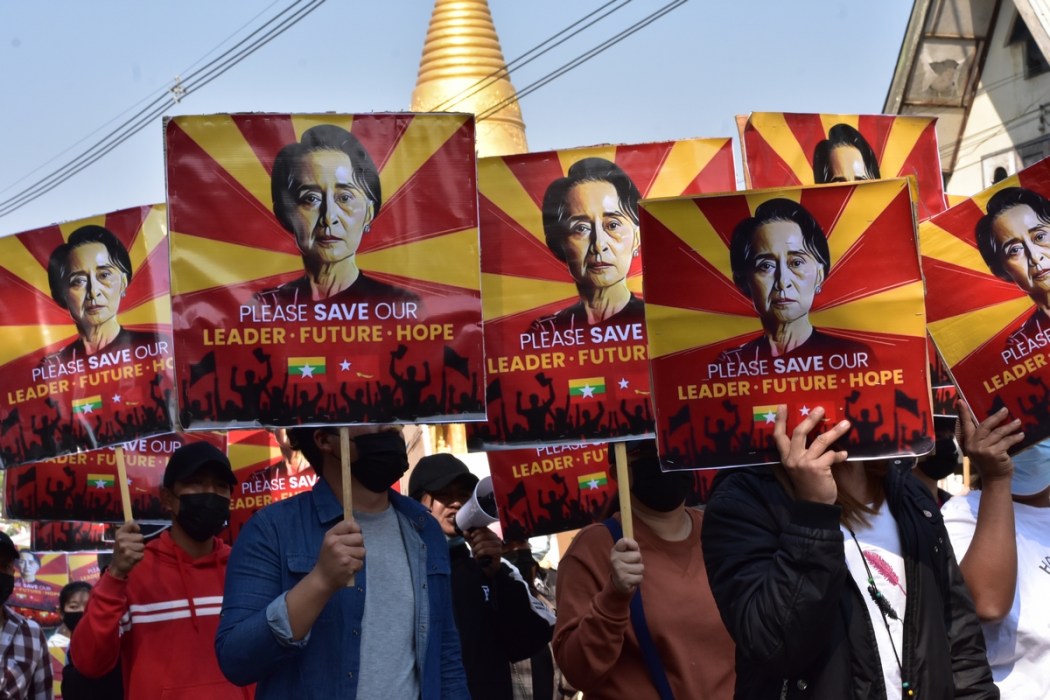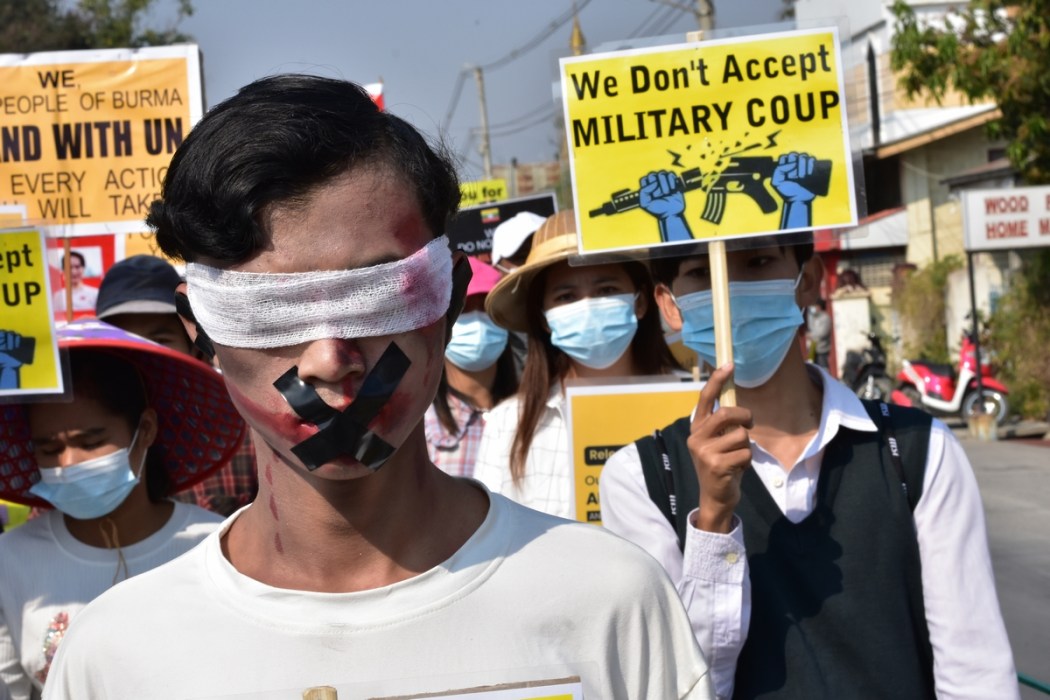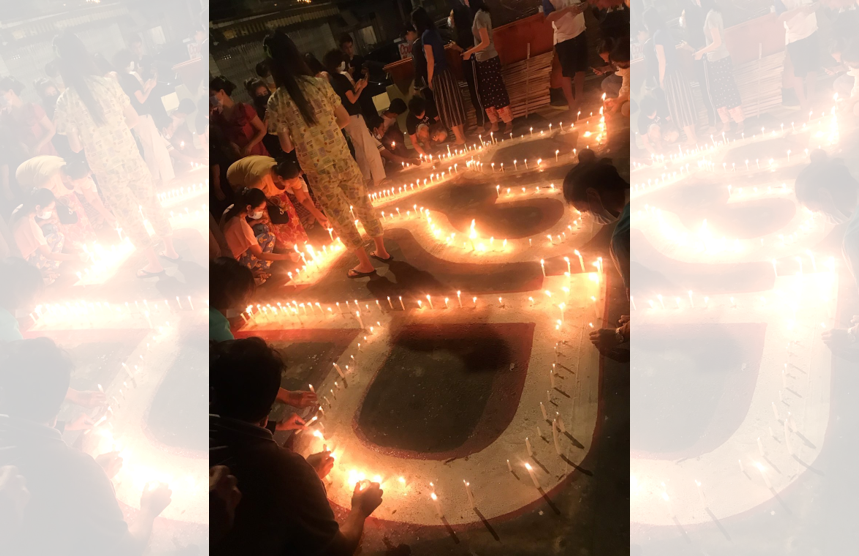By T-Fai Yeung
Myanmar’s coup is part of the retreat from democracy around the world. Some commentators see the balance of power swinging against the global democratic bloc unless a way can be found to deter the armed forces from committing crimes against humanity.

Did the military over-react?
February 1, 2021 was when the government led by the National League for Democracy (NLD) was due to hold its first legislative meeting and form a cabinet, but the armed forces shocked the world by detaining key NLD figures including State Counsellor Aung San Suu Kyi and President U Win Myint. Commander-in-Chief Min Aung Hlaing seized political power and declared a year-long state of emergency.
The armed forces, known as the Tatmadaw, said Suu Kyi and NLD officials had ignored accusations of fraud in the election decisively won by her party the previous November — allegations which lacked solid evidence and had been rebutted by the election commission and some foreign electoral observers.
The real reason for the coup was widely believed to be the military’s fear of losing absolute control over the legislative process and thus their political stranglehold. Yet, the coup was seen by some analysts as an over-reaction since even under the previous system the military wielded veto power in parliament through its constitutionally guaranteed 25 percent of seats.
Furthermore, the Tatmadaw still had a monopoly over economic activities and owned most of Myanmar’s natural resources. The election results, although very embarrassing for the armed forces, would have been unlikely to undermine their economic privileges.

It is perhaps true that the failure of Min Aung Hlaing, who was supposed to retire next year, to reach agreement on obtaining life-long judicial immunity with Aung San Suu Kyi drove him to resort to violence. However, within the existing legislative rules, the Tatmadaw could have obstructed any attempts by Suu Kyi to amend the constitution against them.
China’s controversial position
There is also speculation about China’s possible role in the coup. Min Aung Hlaing mentioned the issue of alleged election fraud during his meeting with Chinese Foreign Minister Wang Yi on January 12, leading some analysts to argue that China supported or condoned the takeover.
Some political observers say that while there is insufficient evidence that China actively supported the coup, Myanmar’s military government could choose to side with authoritarian countries in the absence of Western support. China could tacitly seek to increase the scale of its Belt and Road projects as a prerequisite for consenting to the Tatmadaw’s dictatorship.
There is an alternative interpretation. Aung San Suu Kyi’s government had already taken a pro-China stance to offset Western condemnation and sanctions regarding the expulsion of the Rohingya, and the continuation of Aung San Suu Kyi’s leadership seemed to serve the economic interests of China. The Tatmadaw had a record of unpredictability, which undermined Beijing’s interests. Consequently, some argue that China had little motivation to support Myanmar’s coup in exchange for a “new” political arrangement with more uncertainties.
Western weakness
While it is valuable to investigate the origins of the coup, it is more crucial to prevent further bloodshed. There is no sign that Western-led condemnation and sanctions would be effective in forcing the Tatmadaw to make any concessions, as the volume of trade between Myanmar and those nations and the military assets in those countries is negligible.

The way in which the West counteracts Myanmar’s military will be critical. If it fails to secure the restoration of democracy, this could embolden other authoritarian governments and military leaders around the world who may have similar political ambitions.
President Donald Trump’s sanctions on Iran, Venezuela, and some other authoritarian states gained support in some cases from the European Union, yet failed to secure concessions. Worse, these sanctioned nations often turn to China and Russia to seek support.
Undoubtedly, sanctions in some cases can significantly damage the economic interests of authoritarian regimes. Yet, evidence suggests that little progress is made unless Western nations deploy their forces overseas to help those in need. Authoritarian leaders are increasingly clear about the constraints facing the democratic bloc, which is why they have been emboldened to initiate brutal crackdowns on domestic protests.
The West is facing a dilemma following many past examples of unsuccessful humanitarian intervention, and the chaos created by Covid-19 has made them more hesitant to intervene in other states militarily. The public may be sympathetic to overseas protesters, but will demand their government prioritise local interests, especially if overseas military operations incur a heavy burden on taxpayers.
Democratic constitutionalism is not a panacea for democracy
The hard truth is that Myanmar’s awkward democratic experiment has come to an end because the Tatmadaw have shown no respect for the constitution which they themselves were mainly responsible for drafting. Some may assume that the prospects for democracy can be guaranteed if the political power of the military can be counter-balanced by civilian leaders. Yet, the cases of Venezuela, Bolivia, and several other states in Latin America reflect that the reality is far more complicated.

Oliver Stuenkel, an associate professor of international relations at the Getulio Vargas Foundation in São Paulo, published an article in Foreign Policy on November 30, 2019 to emphasise that corruption and authoritarian tendencies have not faded even though domestic and regional mechanisms have been introduced to protect elected governments against coups.
The main reason is that civilian leaders like Evo Morales, Hugo Chávez, and Nicolás Maduro were tempted to corrupt and amend the constitution unlawfully when political power was concentrated in their hands through their long tenures as president. Their cases support the maxim that “power tends to corrupt, and absolute power corrupts absolutely.”
T-Fai Yeung is a researcher at Global Studies Institute Hong Kong, a blogger for Stand News and a guest contributor to the Hong Kong Economic Journal, Apple Daily, and Linhe Zaobao (Singapore). The Chinese version of this article was published in Linhe Zaobao (Singapore) on February 22, 2021 and translated by Cynthia Chung, who graduated from The University of Hong Kong with a Bachelor of Journalism and a Bachelor of Sociology, and wishes to contribute to human rights advocacy.”
Support HKFP | Policies & Ethics | Error/typo? | Contact Us | Newsletter | Transparency & Annual Report | Apps
| HKFP is an impartial platform & does not necessarily share the views of opinion writers or advertisers. HKFP presents a diversity of views & regularly invites figures across the political spectrum to write for us. Press freedom is guaranteed under the Basic Law, security law, Bill of Rights and Chinese constitution. Opinion pieces aim to point out errors or defects in the government, law or policies, or aim to suggest ideas or alterations via legal means without an intention of hatred, discontent or hostility against the authorities or other communities. |
Help safeguard press freedom & keep HKFP free for all readers by supporting our team

More HKFP OPINION:
HKFP has an impartial stance, transparent funding, and balanced coverage guided by an Ethics Code and Corrections Policy.
Support press freedom & help us surpass 1,000 monthly Patrons: 100% independent, governed by an ethics code & not-for-profit.










